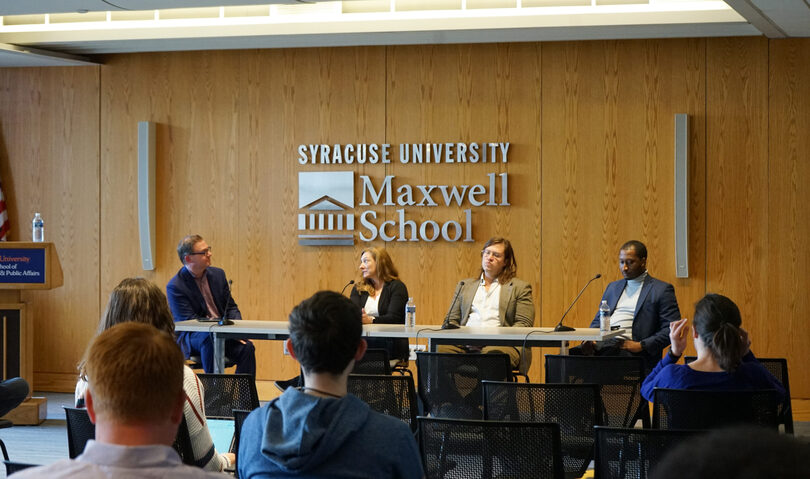Maxwell panel explores disconnect between Gen Z and political participation

D. Sunshine Hillygus, Kevin Munger and Maurice Brown participated in the “Gen Z and the Future of Politics” panel at the Maxwell School of Citizenship and Public Affairs on Monday. The panelists discussed voter apathy, voter turnout and political communication on social media. Leanne Rivera | Staff Photographer
Get the latest Syracuse news delivered right to your inbox.
Subscribe to our newsletter here.
When Maurice Brown co-founded the local advocacy group Uplift Syracuse in 2017, he hoped to engage more people in the political process. But when working with Gen Z and millennials, he’s seen a disconnect.
“Locally, it’s really hard for young people to participate in elected government,” Brown said. “But we’ve found that young people do want to get involved.”
Brown, a Syracuse University alum and veteran who’s currently a candidate for the Onondaga County legislature, participated in a panel titled “Gen Z and the Future of Politics” at SU’s Maxwell School of Citizenship and Public Affairs on Monday. Kevin Munger, a professor of political science and social data analytics at Penn State University and D. Sunshine Hillygus, a professor of political science at Duke University, also participated in the panel.
Panelists discussed reasons for voter apathy among young people, including gaps in education and barriers to voting. In the next five years, Gen Z and millennials are projected to make up over half of U.S. voters. By 2036, over 60% of the voting population will be made up of both age groups. While the last few elections have seen historic highs in youth voter turnout, young people still participate at much lower rates than older generations.
But low voter turnout doesn’t necessarily mean a lack of interest or motivation to participate in politics, Hillygus said.
“It turns out that young people are actually incredibly politically interested,” Hillygus said. “The difference is that young people are less likely to follow through on that intention (to vote).”
Hillygus pointed to structural boundaries that impede young people’s ability to vote, including efforts to shut down university polling locations and refusals to accept student IDs as identification at the ballot box.
It turns out that young people are actually incredibly politically interested. The difference is that young people are less likely to follow through on that intention (to vote).D. Sunshine Hillygus, professor of political science at Duke University.
Munger identified the country’s current political situation as unique and uncharted. The percentage of registered voters in the U.S. over the age of 50 rose by 12% between 1996 and 2019, according to data from the Pew Research Center.
“We have the oldest president in history who just took over from the second-oldest president in history. We have the oldest representative national body of (almost) any country in the world,” Munger said. “That is a big part of why it is a barrier for young people to get involved— because it seems like the people who are running the country aren’t even really aware of the issues and life experience of younger generations.”
Brown also pointed to a growing divide in understanding and accessibility of technology between generations, something he referred to as a “technology trust divide.” A lack of understanding regarding technologies like voter data software leads to skepticism from older generations that heightens the demographic divide, he said.
Munger added that while younger generations rely on social media for political communication, older generations don’t.
“Cable news is still probably the most important location for political communication in the United States,” Munger said. “But basically, no one under 40 watches it at all.”
In addition to growing up in the digital age, Gen Z is the most ethnically diverse generation to date and the least religiously affiliated, said Christopher Faricy, the event moderator and an associate professor in the political science department.
Faricy also noted that members of Gen Z lean toward progressive political and social views, which they often don’t see represented by political candidates. When young people don’t see either party promoting their views, they often don’t vote, Brown added.
Hillygus said while young people engage with politics through protests and marches, policy change happens because of elections and high voter turnouts.
The panelists emphasized the importance of education when it comes to voter turnout but acknowledged the school system’s limitations. On top of a lack of practical instruction on voter registration and the electoral system, teachers often choose not to incorporate current issues into their lessons out of fear of opposition from parents, Hillygus said.
“It’s not enough to put up a table in the cafeteria,” Hillygus said. “It needs to be in a classroom, with the ability to answer questions about the form.”
Despite barriers, Brown pointed to an increasing number of young people finding avenues into politics and political offices as a sign of progress. In January, former March for Our Lives organizer Maxwell Frost became the first member of Gen Z to serve in Congress after being elected as the representative for Florida’s 10th district in the 2022 midterm elections.
“I see him as inspiration but also hope that young people are going to run for office,” Brown said.





